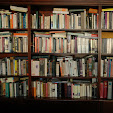First line: "Most days I wish I was a British pound coin instead of an African girl. Everyone would be pleased to see me coming. Maybe I would visit with you for the weekend ..."
This book delicately suggests its entire self (plot and metaphors) in these first lines. By the end of the book, Little Bee has only managed to visit with Sarah and her son Charlie for a bit more than a weekend. She cannot transform herself into a British anything, despite learning proper English language and trying to learn the idioms. (She knows just how important language is; but when she calls the taxi driver a "cock," thinking--based upon her experiences and close attention to language--that she is giving him a compliment--well, this episode suggests from the beginning that she will not ever be able to transform herself successfully.) Charlie choosing to play hide-and-seek at the wrong moment brings down the police; and although Sarah and Charlie try to help Little Bee by gathering her story as one of hundreds, adding weight (pounds?) to hers, in the end their whiteness (Britishness) betrays her on yet another African beach.
One of the things that's interesting is that this is the third book I've read this month which alternates among/between points of view. Here, it is Little Bee and Sarah; POSTMISTRESS has several; 19th WIFE bounces between two stories, present-day and 1870s. It seems to be the new strategy for adding complexity to stories. (Weirdly, I find myself on this wave without knowing there was a wave; my YA Victorian trainwreck manuscript bounces between Elizabeth and Mr. Wilcox.) Is anyone else finding any other books that use two voices or two points-of-view?
